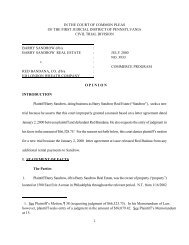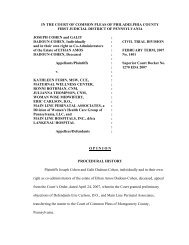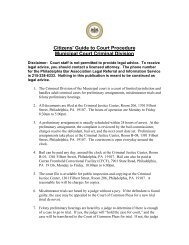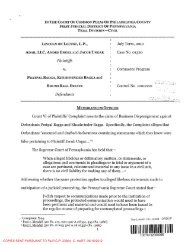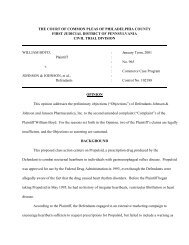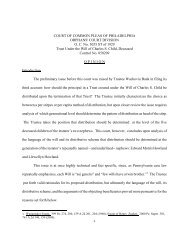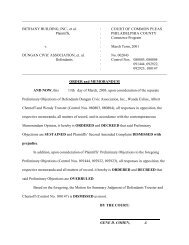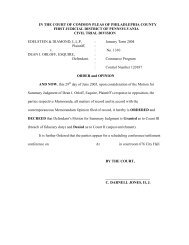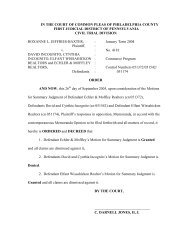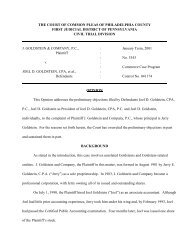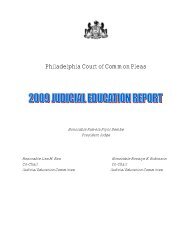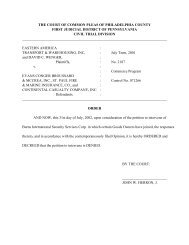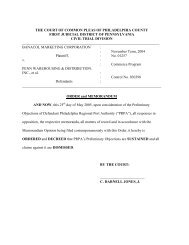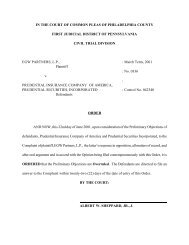OPINION - The Philadelphia Courts
OPINION - The Philadelphia Courts
OPINION - The Philadelphia Courts
You also want an ePaper? Increase the reach of your titles
YUMPU automatically turns print PDFs into web optimized ePapers that Google loves.
determine preliminary objections.” 3 Appellants are correct that they timely filed an<br />
answer to appellees’ preliminary objections. However, appellants never filed a response<br />
to appellees’ Motion to Determine Preliminary Objections. “It is only within the<br />
response to the Motion [to Determine Preliminary Objections] that a responding party has<br />
the opportunity to include a Memorandum of Law explaining to the Court why the<br />
preliminary objections should be overruled.” See Durkin v. Breen, 2005 Phila. Ct. Com.<br />
Pl. LEXIS 391, *2-3 (2005).<br />
Motions Court in <strong>Philadelphia</strong> County will only send a motion to the appropriate<br />
judge for consideration when there is a complete motion “package.” According to the<br />
<strong>Philadelphia</strong> Court of Common Pleas Civil Practice Manual, “When the motion is<br />
initially filed, the motion clerk enters the response date into a computer. When that date<br />
arrives, the motion file is forwarded to the appropriate judge for determination, whether<br />
the response has been filed or not. It is incumbent upon responding counsel to respond to<br />
the motion in a timely fashion…” See Civil Practice Manual, Twelfth Edition, § 7-2.7.<br />
Appellants simply failed to follow the local rules by not filing a timely Response to the<br />
Motion to Determine Preliminary Objections.<br />
<strong>The</strong> case of Schuylkill Navy v. Langbord, 1999 Pa. Super. 75, 728 A.2d 964<br />
(1999) is particularly applicable to the case at bar. Similar to the present case, the<br />
appellants in Schuylkill Navy filed an answer to appellees’ preliminary objections, but<br />
failed to file a response with supporting memorandum of law in a responsive motion<br />
3 Indeed, the <strong>Philadelphia</strong> Civil Rules distinguish between an answer to preliminary objections and a<br />
response to a motion to determine preliminary objections. See Phila. Civ. Rule *1028(c)(5) (“An answer<br />
to preliminary objections (as opposed to a Response to the Motion to Determine Preliminary Objections) is<br />
required only to preliminary objections raising an issue under Pa.R.C.P. 1028 (a)(1), (5) and (6) provided a<br />
notice to plead is attached to the preliminary objections. An answer need not be filed to preliminary<br />
objections raising an issue under Pa.R.C.P. 1028(a)(2), (3) and (4).”) (emphasis added).<br />
3



